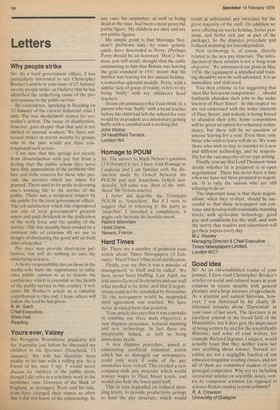Hard Times
Sir: There are a number of pointstin your article about Times Newspapers (3 February: `Hard Times') that need clarification.
Firstly, you say that it was a mistake of management `to bluff and be called'. We have never been bluffing. Last April, we told union General Secretaries and our staff what needed to be done, and that if negotiations could not be concluded by November 30, the newspapers would be suspended until agreement was reached. We have never deviated from that position.
Your article also says that it was a mistake to combine our three main objectives: a new disputes procedure, reduced manning and new technology. In fact these are inseparably linked, as well as being immediate needs.
A new disputes procedure, aimed at eliminating unofficial industrial action which has so damaged our newspapers, could only work if some of the pay anomalies were solved. This needed a new company-wide pay structure which would restore wages to Fleet Street levels, and would also help the lower paid staff.
This in turn depended on reduced manning levels, to provide productivity savings to fund the pay structure, which would result in substantial pay increases for the great majority of the staff. (In addition we were offering six weeks holiday, better pensions, and better sick pay as part of the package). So the disputes procedure and reduced manning are interdependent.
New technology is, of course, directly related to the new pay structure. The introduction of these systems is not a long-term objective'. We announced our plans in May 1976: the equipment is installed and training should by now be well-advanced. It is an immediate and vital need.
You then criticise us for suggesting that 'men like hot-metal compositors. . . should forthwith abandon their jobs in the wider interest of Fleet Street'. In this respect we are not concerned with the wider interests of Fleet Street, and nobody is being forced to abandon their jobs. Sortie compositors will be given an option for voluntary redundancy, but there will be no question of anyone leaving for a year. Even then, only those who wish to leave will do so. We want those who wish to stay to transfer to a new and different technology, and be responsible for the vast majority of our type setting..
Finally, you say that Lord Thomson 'must decide whether he is prepared to re-open negotiations'. There has never been a time when we have not been prepared to negotiate. It is only the unions who are still refusing to do so.
The important issue. is that these negotiations, when they re-start, should be successful so that these newspapers can continue and develop with reasonable manning levels, with up-to-date technology, good pay and conditions for the staff, and with the surety that readers and advertisers will get their papers every day.
M J. Hussey Managing Director & Chief Executive Times Newspapers Limited, London WC1


































 Previous page
Previous page